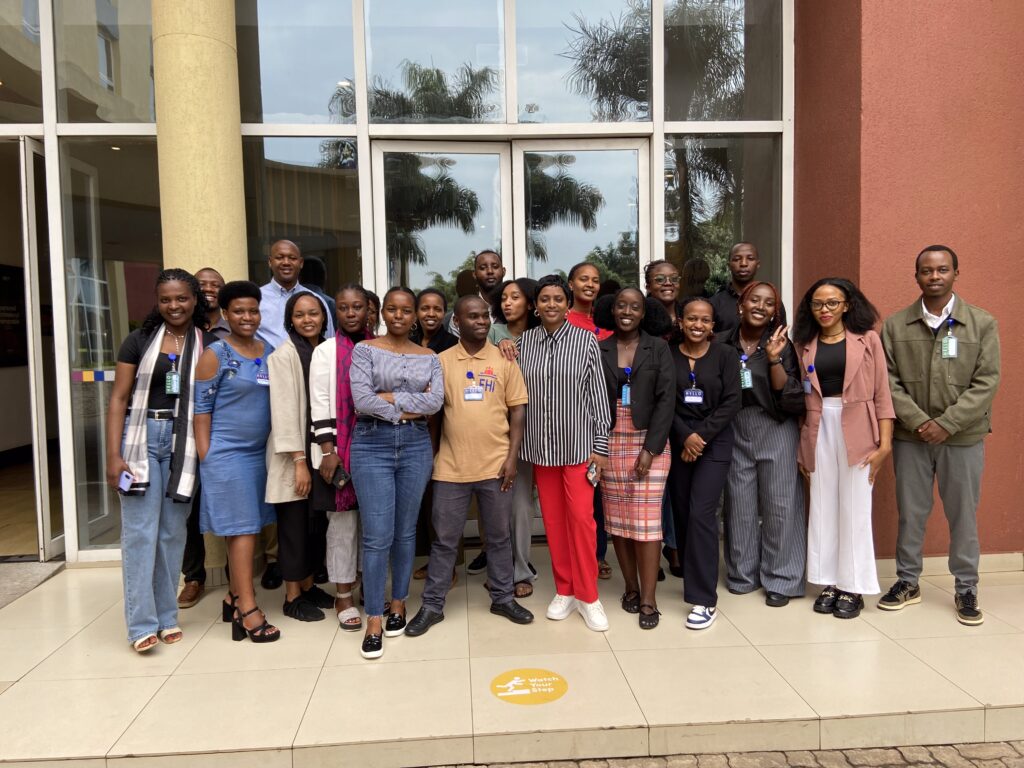
Introduction
From 17th to 19th September 2025, Medical Doctors For Choice (MDFC) staff participated in a 3 day training on Values Clarification and Attitudes Transformation (VCAT) and Bodily Autonomy, organized by the Safe Abortion Action Fund (SAAF) in collaboration with SPECTRA Rwanda. The sessions were facilitated by UMUHOZA Chantal, CEO and Founder of SPECTRA Rwanda.
The training brought together grantees under the SAAF program in Rwanda, including MDFC, Friends for Health Initiative (FHI), and Women Rise for Change (WRC). It provided a unique opportunity for participants to deepen their understanding of bodily autonomy, reflect on how personal values influence safe abortion advocacy, and strengthen inter-organizational collaboration for reproductive health and rights.
Objectives
- To build a shared understanding of bodily autonomy and its role in reproductive health and rights.
- To clarify individual and organizational values that influence advocacy and service delivery.
- To examine Rwanda’s legal framework on abortion in relation to international standards and human rights.
- To strengthen collaboration among SAAF grantee organizations for more effective advocacy.
- To identify practical strategies for advancing access to safe abortion services in Rwanda.
Day-by-Day Highlights
Day 1: Understanding Bodily Autonomy and Values
The training began with participant introductions from MDFC (Medical Doctors For Choice), FHI (Friends of Family Health), and WRC (Women Rise for Change). Facilitators emphasized that bodily autonomy is realized when individuals have access to accurate information and the ability to make informed decisions.
Interactive exercises such as “Yes/No/It Depends,” story-sharing, and “Cross the Line” enabled participants to reflect on their personal values, experiences, and collective perspectives on abortion. Discussions also focused on how personal beliefs influence advocacy energy, organizational decisions, and service provision.
The day concluded with the recognition that personal values shape advocacy journeys, and that effectively managing value diversity is critical for building inclusive, rights-based approaches to safe abortion advocacy.
Day 2: Legal Frameworks and Value Implications
Day two began with a recap of Day 1, followed by an in-depth exploration of Rwanda’s abortion law in reference to the Maputo Protocol, the Penal Code (Articles 183–187), and the 2018 law on human reproductive health (amended in 2023).
Key issues discussed included:
- The requirement for approval by an obstetrician/gynecologist (Article 71) before abortion can be performed, which may compromise women’s wellbeing.
- Legal inconsistencies, such as minors requiring consent for abortion services while independently accessing contraception and HIV treatment.
- The gap between national laws and international human rights standards.
Participants also discussed inter-organizational collaboration as a strategy to strengthen advocacy, improve communication, and address legal, social, and cultural barriers to access.
Day 3: Organizational Learning and Collaboration
The final day opened with a reflection on Day 2, followed by a screening of the documentary “100 Faces”, which highlighted real-life challenges faced by women and girls seeking abortion services.
Organizations then presented their profiles, missions, and current SAAF funded activities. MDFC had the opportunity to showcase AASAPFinder, which generated strong interest among participants as an innovative tool to connect beneficiaries with safe abortion services and information.
A highly engaging exercise followed, where participants drew a map of Rwanda and labeled ongoing initiatives in their areas of work:
• Awareness raising (yellow)
• Capacity building (pink)
• Advocacy (orange)
• Service provision (green)
This visual mapping helped identify geographical overlaps, gaps, and synergies, sparking discussions on how organizations can better coordinate efforts across different regions.
The training concluded with a commitment to sustained collaboration, including the creation of a WhatsApp group for continued dialogue and joint planning on abortion related advocacy.
Key Takeaways
- Bodily autonomy is both a personal and collective responsibility, requiring access to information, services, and supportive legal frameworks.
- Values clarification is essential for organizations to remain rights-based and inclusive in advocacy and service delivery.
- Legal inconsistencies in Rwanda particularly concerning minors and provider restrictions; create barriers that need to be addressed through sustained advocacy.
- Collaboration among grantees strengthens impact and provides opportunities for resource sharing, collective advocacy, and greater visibility.
- Innovation in advocacy, such as digital platforms like AASAPFinder, can play a key role in expanding access to safe abortion information and services.
Conclusion
The 3 day VCAT training offered SAAF grantees in Rwanda a vital space to reflect, learn, and strategize on advancing bodily autonomy and access to safe abortion. Participants left with a stronger understanding of how values, laws, and advocacy intersect, and a renewed commitment to collaborative action.
For MDFC, the training reinforced the importance of aligning organizational strategies with rights based approaches and leveraging tools like AASAPFinder to reach more beneficiaries. The commitment to maintain communication through a shared WhatsApp group ensures that the momentum built during the training will continue, supporting collective advocacy for safe, stigma free healthcare services in Rwanda.
